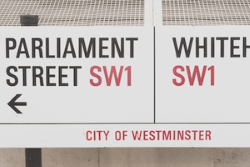 The Office of Tax Simplification (OTS) has published its first review of VAT, with recommendations mainly aimed at ‘simplification’, including a call for a ‘comprehensive review of the reduced rate, zero-rate and exemption schedules’ and a review of ‘the turnover level above which a business must enter the VAT system and charge VAT on its sales’, noting that ‘at £85,000 the UK has one of the highest levels in the world.’
The Office of Tax Simplification (OTS) has published its first review of VAT, with recommendations mainly aimed at ‘simplification’, including a call for a ‘comprehensive review of the reduced rate, zero-rate and exemption schedules’ and a review of ‘the turnover level above which a business must enter the VAT system and charge VAT on its sales’, noting that ‘at £85,000 the UK has one of the highest levels in the world.’
Contains public sector information licensed under the Open Government Licence v3.0.
Government writes:
The Office of Tax Simplification (OTS) will shortly publish a report setting out a range of proposals for simplifying VAT. After over 40 years, the tax is showing its age. What was meant to be a simple tax has become highly complex and it has not kept pace with changes in society.
Angela Knight CBE, Chair of the OTS board, said: ‘This report presents an opportunity to start addressing the many anomalies of VAT. The tax is awash with layers of complexity reflecting both its evolution over the last 45 years and aspects of the Purchase Tax that VAT replaced. For small businesses, this report will propose ways of simplifying many irritating administrative technicalities and kick off a debate about the registration threshold’.
Paul Morton, OTS Tax Director, said: ‘This report will flag up the effects of the registration threshold, how entry into the VAT system might be smoothed and many other areas where simplification would be beneficial, particularly the complex and often subjective boundaries between those supplies which are standard rated and those which fall within the reduced or zero-rates or which are exempt. In addition, there will be opportunities to build on the good work of the last few years in improving the administrative aspects of the running of the VAT system’.
The OTS’s core recommendations will include:
- that the government should examine the current approach to the level and design of the VAT registration threshold, with a view to setting out a future direction of travel for the threshold, including consideration of the potential benefits of a smoothing mechanism
- that HMRC should maintain a programme for further improving the clarity of its guidance and its responsiveness to requests for rulings in areas of uncertainty
- that HM Treasury and HMRC should undertake a comprehensive review of the reduced rate, zero-rate and exemption schedules, working with the support of the OTS
- The most significant issue identified in the report is the VAT registration threshold – the turnover level above which a business must enter the VAT system and charge VAT on its sales. At £85,000 the UK has one of the highest levels in the world.
The report also
- makes recommendations for improving the day to day administration of the tax, including better and more accessible guidance and a less uncertain penalty system. This would particularly benefit small businesses
- considers specific areas of technical difficulty, including the partial exemption regime, the capital goods scheme, the option to tax and other special schemes
- Notes for editors
- The OTS is the independent adviser to government on tax simplification, challenging tax complexity to help all users of the tax system; it does not implement changes – these are a matter for government and for Parliament.
This report takes a wide-ranging look at the potential for VAT to be simplified, based on feedback from over 80 trade associations, businesses, professional bodies and individuals. VAT was introduced in 1973 on entry of the UK into what is now the European Union. VAT is the third largest source of tax revenue collected by HMRC after income tax and National Insurance Contributions, raising £120bn in 2016-17 which amounted to 22.5% of all taxes.
